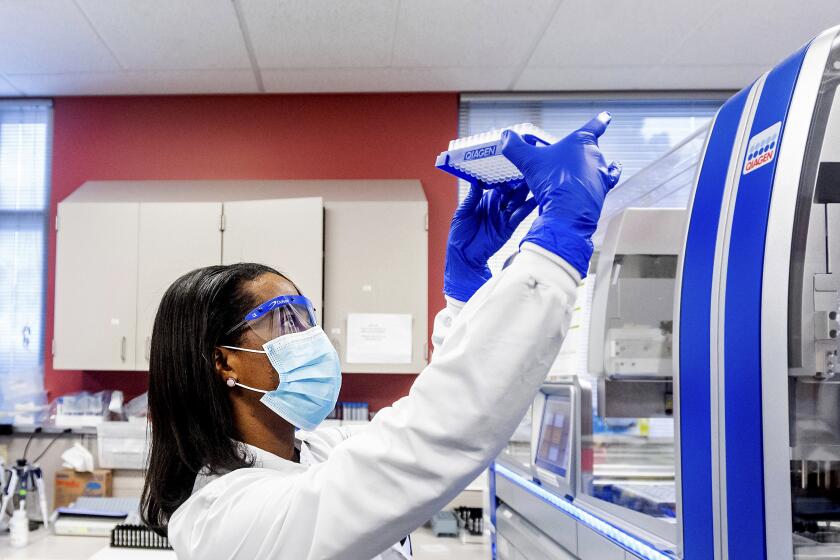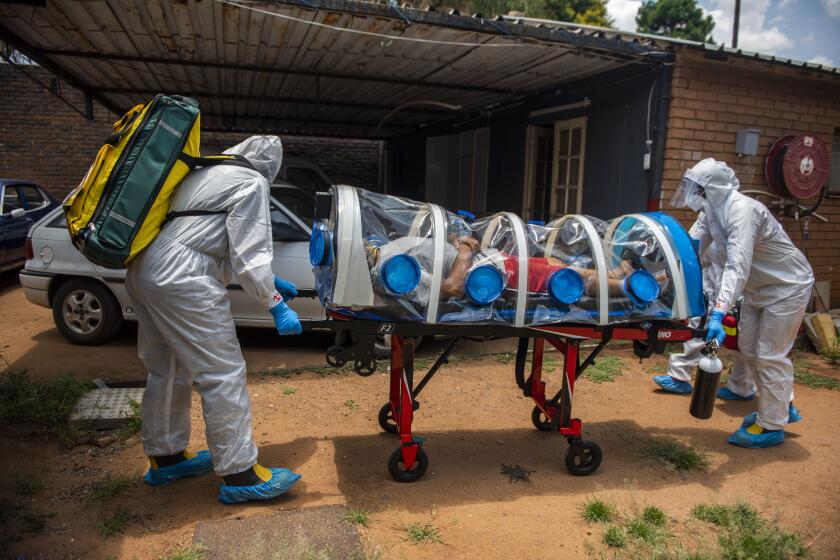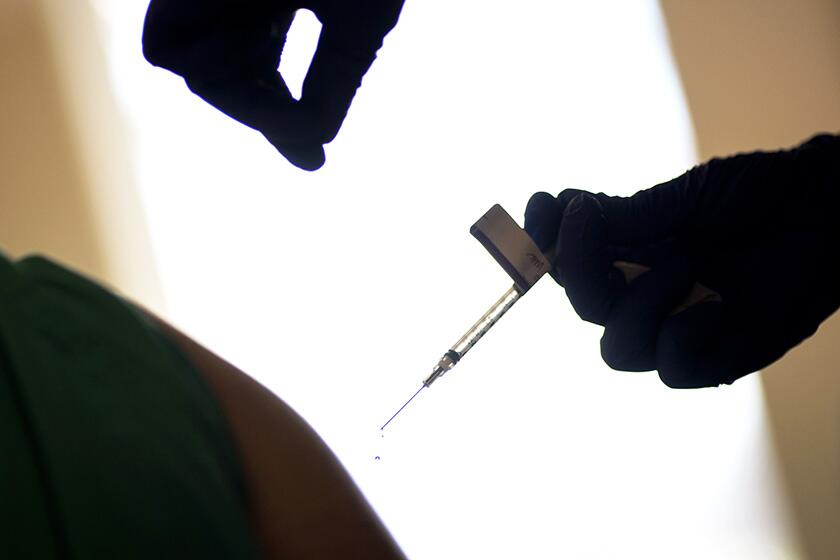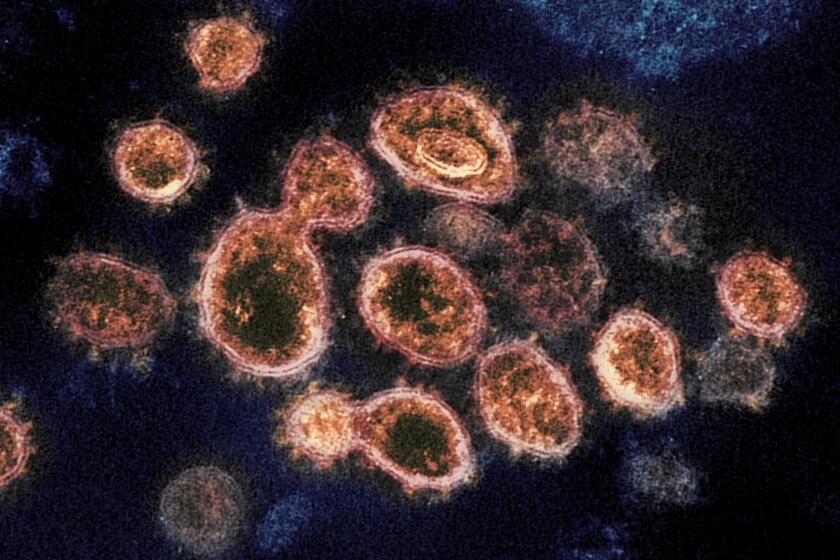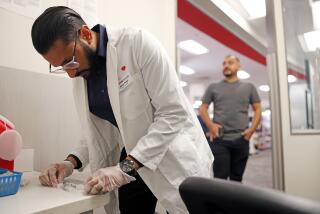New coronavirus variants are everywhere: Will they drag out the pandemic?
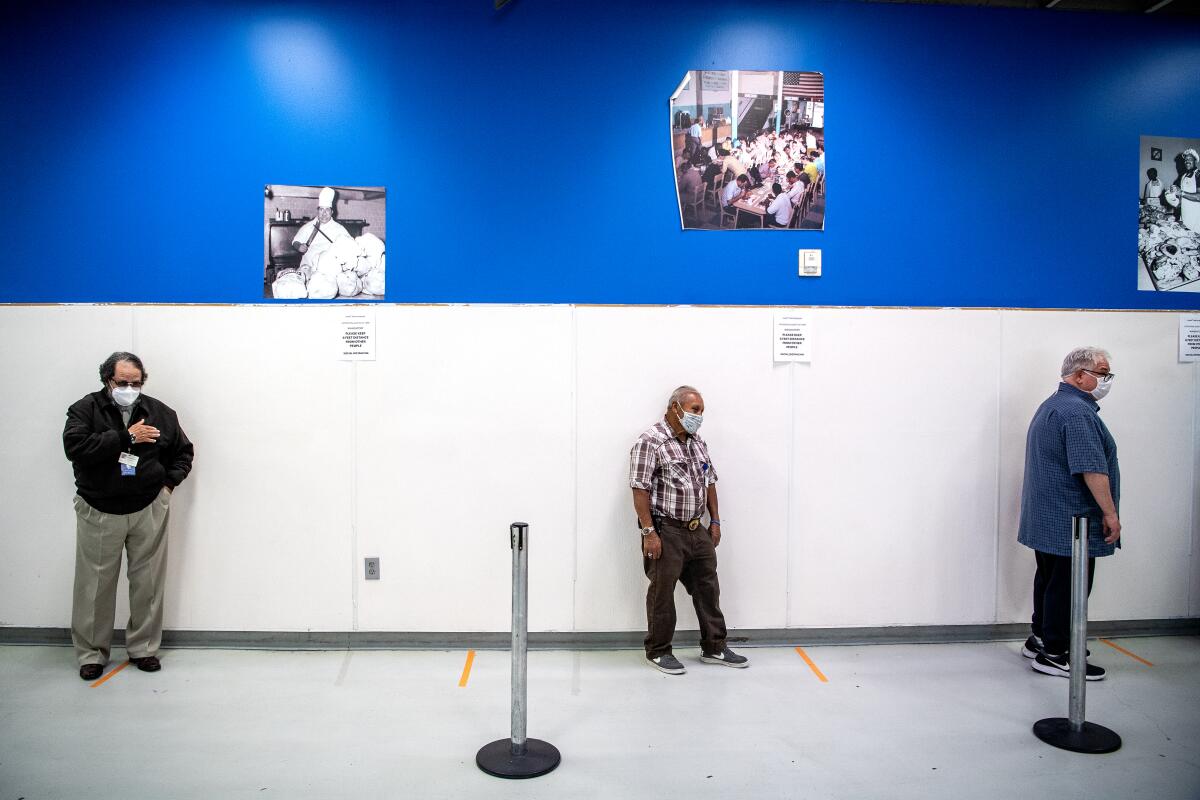
- Share via
Just when it looked like there might be a light at the end of this dark pandemic tunnel, along comes a suite of new coronavirus strains that are more transmissible, at least partially resistant to vaccines and able to infect people who’ve already had COVID-19.
And they’ve all been detected in the United States.
If these developments have your hope fading and dread rising, you are not alone. Many are wondering how these variants will affect the course of the pandemic — particularly, whether they’re a sign that we’ll never be able to get ahead of the virus. Are we going to be socially distanced for the rest of our lives?
To find out whether this despair is merited, I reached out to epidemiologists, doctors and infectious-disease experts. And that’s when I encountered the first good news I’ve heard in a while: None of them are freaking out.
“I am not in panic mode,” said Dr. Eric Toner, a senior scholar at the Johns Hopkins Center for Health Security.
Though he acknowledged that the new variants of SARS-CoV-2, the virus that causes COVID-19, will pose challenges, he doesn’t consider them game changers.
“They tell us that we have to continue to work hard — and maybe harder — to stop the spread of the virus, but that existential angst doesn’t need to exist,” he said. “We will get out of this pandemic.”
Though some of the variants are more resistant to the first generation of COVID-19 vaccines, that doesn’t mean the vaccines are useless, said Dr. Annabelle De St. Maurice, who leads pediatric infection control for UCLA Health.
“Even in years when we don’t get a great match with the flu vaccine, we see some benefit of immunization,” she said. “And that’s the same for SARS-CoV-2. Even if the vaccines are less efficient, getting the vaccine is better than not getting the vaccine.”
The Biden administration is boosting efforts to identify and track coronavirus variants to help scientists see where the pandemic is heading next.
Dr. Adam Lauring, who studies how RNA viruses mutate at the University of Michigan, agreed.
“I know people are concerned about the variants — will the vaccines work as well?” he said. “But, boy! If we got 50% to 70% vaccine effectiveness against influenza each year, we’d be ecstatic.”
Breathing a little easier? Here’s more of what they and other scientists had to say about the new variants and how they might affect the ability to end the pandemic.
Are you surprised to see coronavirus variants that are more transmissible or vaccine resistant?
It’s hardly a surprise that the coronavirus has changed over time — that’s what viruses do, De St. Maurice said.
As the virus makes copies of itself, it is bound to make mistakes. And since December 2019, the coronavirus has made copies of itself in more than 100 million people across the globe. All those infections have provided ample opportunity for it to change, she said.
However, most of those changes are so-called silent mutations. That means they don’t affect the way the virus replicates, how it spreads or the damage it inflicts on its human hosts.
What scientists couldn’t know ahead of time was when, or even if, a mutation would arise that would significantly affect the trajectory of the pandemic — making the virus more transmissible, for instance, or more resistant to vaccines.
“Everyone knew it was a possibility,” Toner said. But “anyone who said, ‘I knew this was going to happen,’ must have a pretty good crystal ball.”
We’ve been told the coronavirus is seasonal. Can we still expect to see a decline in cases in the spring and summer?
The more people who get vaccinated now, the less virus we can expect to see in the summer, even with the new variants in the mix, said Chunhuei Chi, director of the Center for Global Health at Oregon State University.
“The hope is that we are able to step up our vaccination, and when an adequate number of people are vaccinated, it will slow down the spread,” he said.
Researchers once believed t would take months or even years for the virus to develop resistance to vaccines. The speedy evolution is largely a result of the virus’ unchecked spread.
Toner said he’s hopeful that 40% to 50% of Americans will be vaccinated by the beginning of the summer. If that’s the case, coronavirus cases, hospitalizations and deaths can be expected to drop significantly — along with opportunities for the virus to stumble upon additional mutations.
Regardless of the transmissibility of any current or future variant, the experts expect to see less spread in the summer months. In part, that’s because our behaviors change when the weather heats up and we’re able to spend more time outside.
“What drives transmission is really gatherings among households, like at the holidays,” De St. Maurice said. Gathering outdoors is safer than gathering indoors, she added.
Do the new variants make herd immunity harder to achieve?
There is no evidence to suggest that, Chi said.
However, “the fact that they are more contagious increases the urgency of mass vaccinations to create the necessary herd immunity to slow down the spread,” he said.
Most experts believe there is some crossover immunity among coronavirus variants, so if you’ve been vaccinated against one version, you will probably have at least partial immunity to others, Toner said.
The question of how many people must be vaccinated to reach herd immunity against COVID-19 is of crucial importance. Experts say the number is probably higher than previously thought.
But if you’re wondering whether SARS-CoV-2 will ever be completely eradicated, the answer is probably no.
Lauring said the coronavirus might come to behave like influenza.
“We might wind up in a place where every year there’s a time of year where there’s a lot of SARS CoV-2 around, and some people get sick, and some people get very sick, and some people die,” he said. “But it won’t be where we’re at now.”
Toner said he can imagine a future in which people will get a new coronavirus shot every few years or so. A new vaccine would probably be required less often than the flu shot but more often than the shot for measles.
Should these new variants change our public health strategy for fighting the virus?
The general consensus: Not really.
“What we can say after looking at other countries that have seen big spikes with the variants is that those big spikes have been controlled in the same way we have controlled our spikes — with social distancing, wearing masks and avoiding indoor crowds,” Toner said.
Confusion over the terms ‘variant’ and ‘strain’ predate this coronavirus. It seems virologists never got around to defining their terms.
He added that the variants should serve as a reminder to stay vigilant.
“It is important for us to not be seduced that this is all over,” he said. “Whether or not we see a big impact from the variants, there will continue to be spikes and surges across the country.”
And just to be clear, we can still beat this pandemic, right?
Right, De St. Maurice said. But we’ll have to put in the work.
“We need to reduce transmission to stop the variants from occurring,” she said. “The longer we let it mutate, the more likely we are to have variants that can evade vaccine immunity.”
Toner also expressed certainty that the pandemic is bound to end.
“Even if we did nothing, we would get out of this pandemic,” he said. “It is really a matter of how quickly, at what cost and how many lives will be lost.”
In the future, COVID-19 will probably become an ordinary part of life — a common respiratory illness like those caused by other coronaviruses that were circulating before the pandemic, he said.
“Kids will get vaccinated for it, adults will get periodic boosters or revaccinations every few years, and there might be small outbreaks that make the news,” he said. “But it won’t overwhelm hospitals; it won’t cause huge loss of life.”
